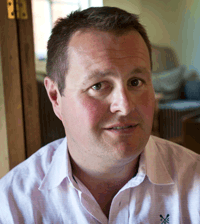FW Awards 2009: Arable Farmer of the Year finalist – Ben Atkinson

Sensible sustainable growth without support is Ben Atkinson’s long-term goal for his all-arable family business. He was Farmers Weekly’s regional representative from 2004 to 2007.
Since partnership with his brother ended amicably last year Ben has run 2451ha of mainly fenland soils with his father, three full-time staff, one part-timer, plus three casuals in the summer.
“Father’s 67 and now very much takes a back seat,” he says.
Clearly passionate about agriculture and his role in it, Ben has a straightforward rotation based on winter wheat, oilseed rape, beans and sugar beet.
The land, average field size 14.6ha, is part-owned, part-rented and part contract-farmed.
Flexibility drives his machinery policy. It combines modern, high-output equipment, including two Challenger 765 tracked tractors and two 32m boom sprayers (one self-propelled), with employing local contractor Richard Sneath.
“We have a strong working relationship, and I rely very much on him,” says Ben. The aim is to minimise fixed costs in case contract-farmed land is lost, he explains.
Treated well, the land with “controllable” blackgrass produces good yields. The 10-year rolling averages for wheat and rape are 9.83t/ha (3.98t/acre) and 4.35t/ha (1.76t/acre).
For three seasons that treatment has increasingly involved SL cultivators from Simba which the farm has helped develop. With two Horsch drills, they are the backbone to wheat and rape establishment, the latter being sown directly from kits on the cultivators.
Ploughing – time-consuming and costly, but essential once in the rotation – is done only ahead of beans and sugar beet. Power-harrowing is confined to shallow seed-bed preparation.
“Maintaining good structure on flat land near sea level is essential to achieve consistently high yield and good drainage,” says Ben.
As proof of the new approach’s success almost none of his 819ha of winter rape last season was lost, despite some being sown in early October.
Some wheat straw is sold, and for five years phosphate, potash and lime applications have been guided by Soyl’s nutrient mapping system. “I’m fairly convinced it’s worthwhile. It’s not given massive savings, but it means we are putting the products where they’re needed.”
This season he tested the firm’s GPS Soylsense variable rate N system based on satellite imaging.
For other inputs advice BASIS-qualified Ben relies on discussions with three agronomists, one from Frontier and two from Masstock.
He also belongs to Greenways agronomy group and various chemical manufacturers’ growers’ clubs. “All are very worthwhile, delivering great benefits.”
The fertile soils and high protein-diluting yields rule out growing wheats other than barn-filling feed varieties. Four-fungicide spray programmes are the norm, with nitrogen dressings of up to 220kg/ha for first wheats.
For oilseed rape, Dekalb varieties are favoured.
Marketing is through a range of outlets based on regular price monitoring through several sources and using futures and options when available at “reasonable” cost.
“If I can see a decent profit I’ll lock it in,” he says. “Our wheat average for the 2008 harvest was in the low £130s/t.”
An ODA grain marketing and trading course was particularly helpful, he says, and he recently joined the NFU Cereals board.
Given limited scope for environmental enhancement on the man-made fens, Ben has, after initially rejecting it, made good use of Entry Level Stewardship.
“The scheme seems to tick so many boxes.” It also helps improve the family shoot, which is overseen by someone he believes could be the country’s only retired vegetarian gamekeeper.
Farm facts
- 2451ha all-arable fenland family partnership
- 46% owned, 29% rented, 25% contract-farmed
- Winter wheat and oilseed rape, beans and sugar beet
- Three full-time staff
What the judges liked
- “Hands-on approach achieving optimum yields, but with strong emphasis on wildlife and the environment.
- “Business focused on overheads control via contractor as integral part of managing labour and machinery.
- “Marketing strategies in place to manage risks of volatile commodity markets.”
Three achievements
- Working with manufacturer to develop plough replacement equipment
- Adoption of precision farming techniques
- Use of ELS to enhance man-made fenland environment

